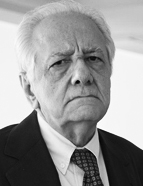

Opposing the "Saquarema view", which suggests that Brazil was destined for unity from the Independence process of 1822 onward, Evaldo Cabral's perspective takes an opposing stance, highlighting federalism, republicanism, and nativist anti-Lusitanian sentiment, all in contrast to Pedro I's centralisation project that ultimately prevailed. The creation of the Brazilian Empire following independence from Portugal encountered resistance, exemplified by the discontent of those involved in the Confederation of the Ecuador (1824). "What should have been our national revolution — Independence — was in reality a counter-revolution orchestrated from Rio by a prince and carried out by a high-ranking civil servant elite, whose very existence was threatened by the Lisbon courts", argues Evaldo Cabral de Mello (Um imenso Portugal, 2002, p. 171). This perspective aligns with Raymundo Faoro's argument in Os donos do poder [The Owners of Power] (1958) about the bureaucratic class's influence in the process of breaking with the Portuguese Empire. As is apparent, the work Um imenso Portugal (2002), which primarily compiles articles he published in the newspaper Folha de São Paulo from 2000 onward, consolidates arguments initially developed in A ferida de Narciso – ensaio de história regional [The Wound of Narcissus — a regional history essay] (2001) and others he would later expand upon in A outra independência – o federalismo pernambucano de 1817 a 1824 (2004). This latter work serves as the historian’s critical response to Saquarema historiography. Other topics explored in Um imenso Portugal are further explored in other works, such as Nassau, governador do Brasil holandês [Nassau, governor of Dutch Brazil] (2006); O Brasil holandês (1630-1654) [Dutch Brazil (1630-1654)] , from 2010, O bagaço da cana – os engenhos de açúcar do Brasil holandês [The Sugarcane Pomace — Sugar Mills in Dutch Brazil] (2012) and A educação pela guerra – Leituras cruzadas da história colonial [Education Through War — Interwoven Readings of Colonial History] (2014).
Although, as already mentioned, he is not a fan of commemorative events, Evaldo Cabral de Mello was one of the historians honoured in Portugal in 2000 with the D. João de Castro Prize for his work O negócio do Brasil - Portugal, os Países Baixos e o Nordeste, 1640-1669 [The Brazil business — Portugal, the Netherlands and the Northeast, 1640-1669]. The National Commission for the Commemoration of the Portuguese Discoveries, led at the time by Commissioner-General and historian Joaquim Romero Magalhães, reissued the work in 2001. O negócio do Brasil revisited the topic of the "sugar war" (a conflict both for control of sugar and financed by sugar). If Olinda restaurada focused on the war against the Dutch itself, detailing how the two opposing sides organised militarily and financed their efforts, Rubro veio explored the imagery and symbolism surrounding the war. In O negócio do Brasil , also published in Dutch in 2005, the author turned his attention to the diplomatic sphere of the conflict in The Hague, observing that historiography "lacked a significant analysis of the international negotiations." This emphasis led to a misunderstanding about the work, suggesting that the recovery of the Northeast was merely the outcome of a diplomatic agreement and a commercial transaction. This misunderstanding arose because, in the first edition of O negócio do Brasil , the Luso-Brazilian struggle on northeastern soil was scarcely highlighted. The author felt that it had been sufficiently covered in Olinda restaurada (O negócio do Brasil, 2011, p. 10-11). In fact, this willingness to adjust his analyses is a hallmark of the author, who, when releasing a new edition of a work, revises, rewrites, and sometimes even reorders passages "to enhance the flow and clarity of the text" (Idem, p. 13).
This work is financed by national funds through FCT - Foundation for Science and Technology, I.P, in the scope of the projects UIDB/04311/2020 and UIDP/04311/2020.
